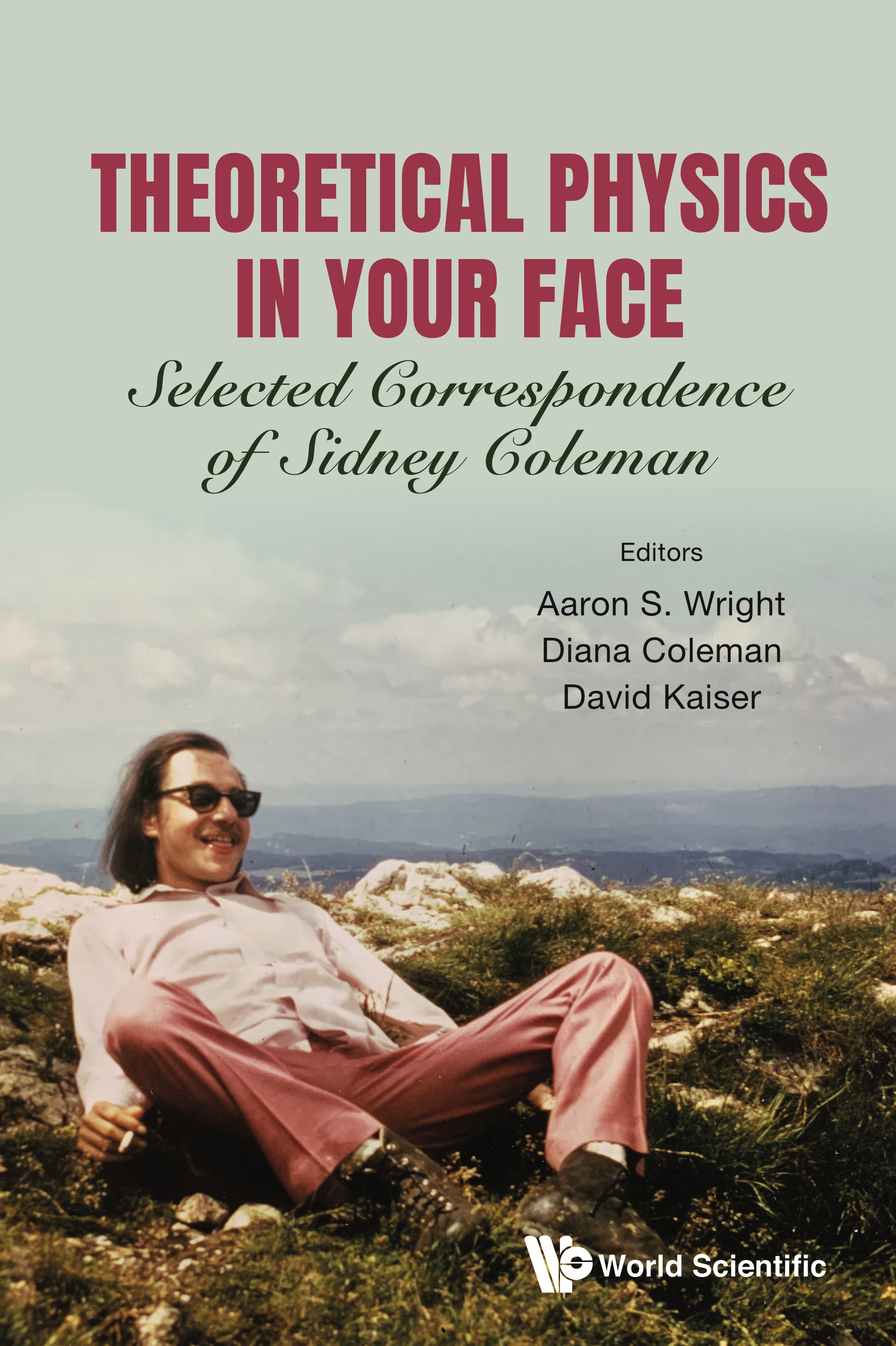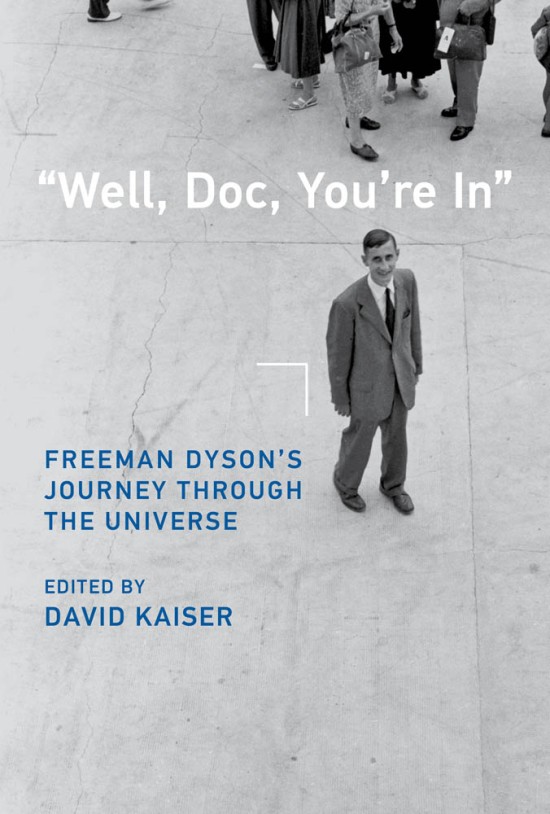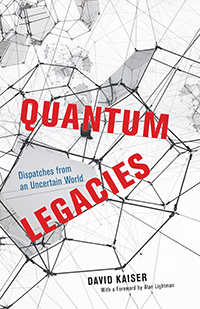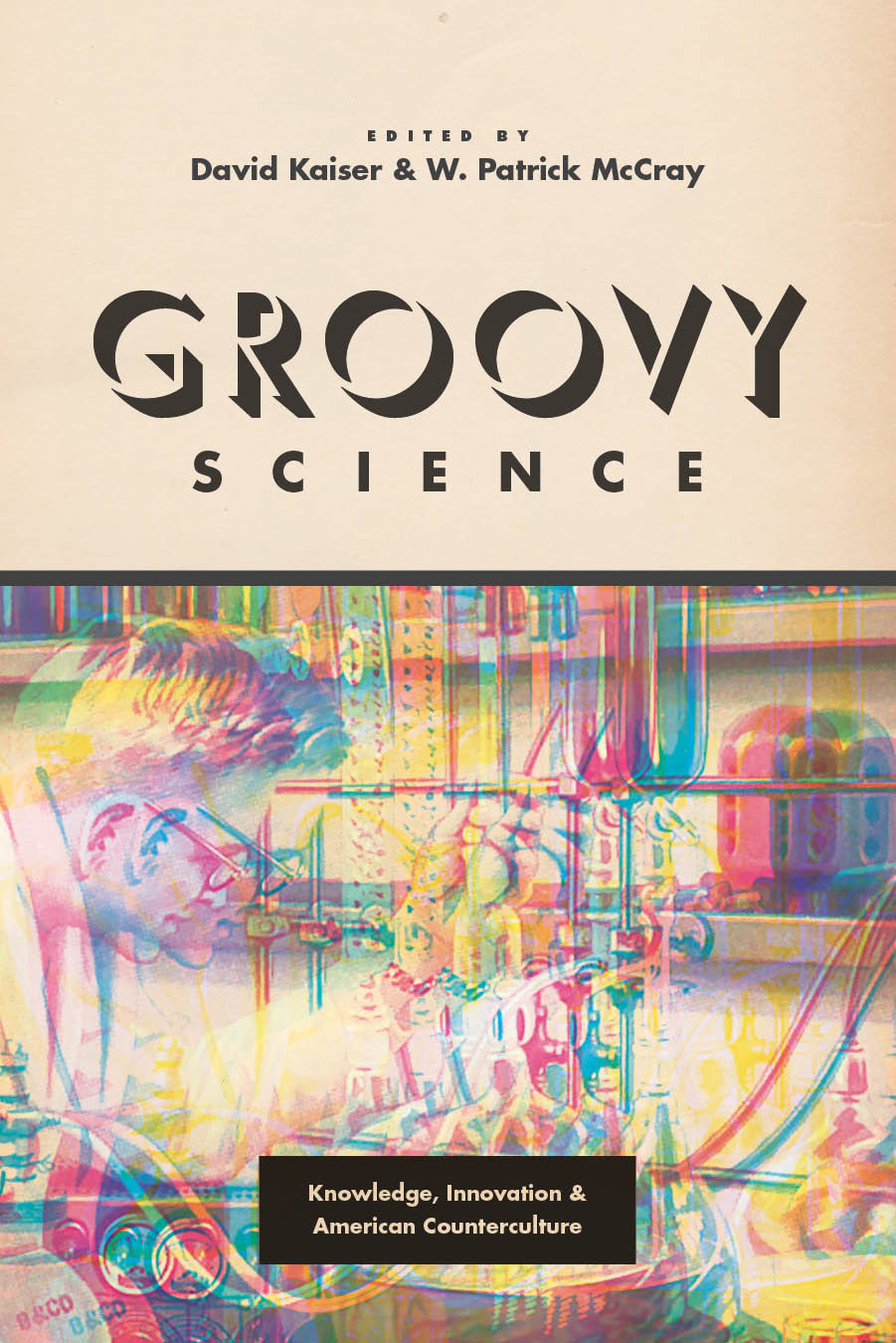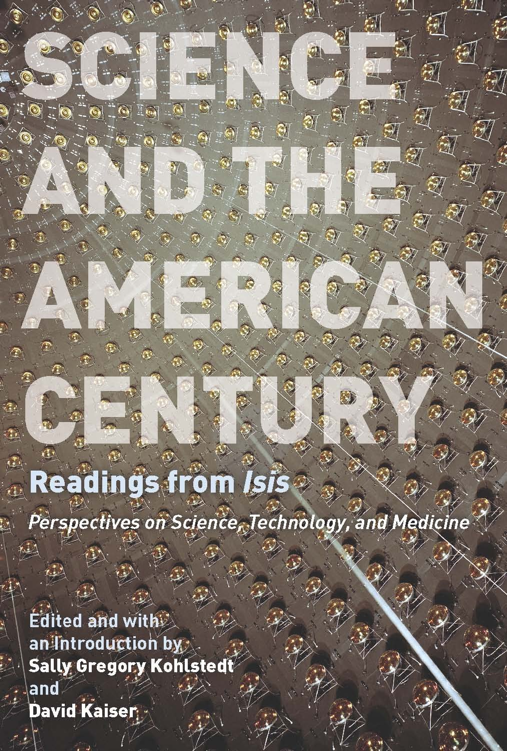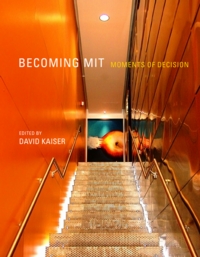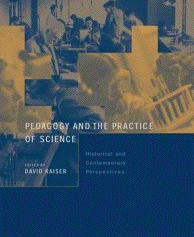Brian Bergstein, "The double helix of science and democracy," Boston Globe (7 February 2025).
Matt O'Dowd, "How many black holes are in the solar system?," PBS Space Time (16 January 2025).
Elizabeth Quill, "How we might finally find black holes from the cosmic dawn," Science News (13 January 2025).
Nyla Husain, "This month in Physics History, January 1928: The Dirac equation unifies quantum mechanics and special relativity," APS News (19 November 2024).
Shayla Love, "The wellness industry is manifesting a quantum world," The Atlantic (11 October 2024).
Darren Orf, "Mars could be the key to finally spotting dark matter," Popular Mechanics (1 October 2024).
Clara Moskowitz, "Dark matter could be hiding out as atom-sized black holes," Scientific American (24 September 2024).
Jess Thomson, "One black hole may pass through our solar system every decade, study finds," Newsweek (17 September 2024).
Noah Haggerty, "Are tiny black holes zipping through our solar system? Scientists hope to find out," Los Angeles Times (17 September 2024).
Emily Conover, "How to spot tiny black holes that might pass through the solar system," Science News (17 September 2024).
Elizabeth Gibney, "Black holes as big as atoms might be speeding through the Solar System," Nature Research Highlight (17 September 2024).
Charles Day, "The solar system as a black hole detector," Physics (17 September 2024).
Jen Chu, "A wobble from Mars could be sign of dark matter, MIT study finds," MIT News (17 September 2024).
Matt O'Dowd, "Do black holes have to be black?," PBS Space Time (1 August 2024).
Jacopo Prisco, "Scientists may have found an answer to the mystery of dark matter. It involves an unexpected byproduct," CNN (17 June 2024).
Carolyn Collins Petersen, "A new way to prove if primordial black holes contribute to dark matter," Universe Today (17 June 2024).
Leah Crane, "Odd black holes smaller than protons may once have littered the cosmos," New Scientist (13 June 2024).
Robert Lea, "'Supercharged rhino' black holes may have formed and died a second after the Big Bang," Space.com (10 June 2024).
Amit Malewar, "Exotic black holes: A byproduct of dark matter," Tech Explorist (7 June 2024).
Matteo Rini, "Colorful primordial black holes," Physics (6 June 2024).
Jennifer Chu, "Exotic black holes could be a byproduct of dark matter," MIT News (6 June 2024).
Diana Solan-Oropeza, "Noclip on! Simiulated primordial black holes could dance through Sun-like stars", Astrobites (29 May 2024).
Leah Crane, "Tiny black holes hiding in the sun could trace out stunning patterns," New Scientist (24 May 2024).
Deepa Jain, "Tiny black holes from the dawn of time may be altering our planet's orbit, a new study suggests," Live Science (16 January 2024).
Cole Meldorf, "Searching for primordial black holes in our own backyard!," Astrobites (5 January 2024).
Laura Bliss, "MapLab: The secret history of GPS," Bloomberg (27 September 2023).
Meghan Bartels, "Oppenheimer alomst discovered black holes before he became 'destroyer of worlds'," Scientific American (21 July 2023).
Sandi Miller, "Professor Emeritus Roman Jackiw, 'giant of theoretical physics,' dies at 83," MIT News (20 June 2023).
Michelle Frank, "The little-known origin story behind the 2022 Nobel Prize in Physics," Scientific American (1 April 2023).
Claire Webb, "Cosmic vision," Aeon (March 2023).
Dimitros Karaiskos, "Quantum physics, GPS, and other mysteries of life," (in Greek), Kathimerini (13 March 2023).
Ryan Dahn, "Gravitation's attraction, 50 years later," Physics Today (10 March 2023).
Heather Hill, "Physics Nobel honors foundational quantum entanglement experiments," Physics Today 75 (December 2022): 14.
Zach Winn, "Community members greet MIT's 18th president," MIT News (28 October 2022).
Michael Feldstein, "If you were designing Cal State today: A proposal out of MIT," eLiterate (25 October 2022).
Daniel Garisto, "This month in physics history: John Stewart Bell quietly rings in new era of quantum theory," APS News (13 October 2022).
David Rosowsky, "Will MIT's proposal for an 'Affordable New Educational Institute' grab hold or fall flat?," Forbes (13 October 2022).
Daniel Garisto, "The universe is not locally real, and the Physics Nobel Prize Winners proved it," Scientific American (6 October 2022).
Isabella Kwai, Cora Engelbrecht, and Dennis Overbye, "Nobel Prize in Physics is awarded to 3 scientists for work exploring quantum weirdness," New York Times (4 October 2022).
Heather M. Hill and Andrew Grant, "Demonstrations of quantum entanglement earn the 2022 Nobel Prize in Physics," Physics Today (4 October 2022).
Davide Castelvecchi and Elizabeth Gibney, "'Spooky' quantum-entanglement experiments win physics Nobel," Nature (4 October 2022).
Jeffrey R. Young, "MIT professors propose a new kind of university for post-COVID era," EdSurge (28 September 2022).
Brittany Bowker, "Under Amy Brand's command, the MIT Press celebrates 60 years of mobilizing knowledge," Boston Globe (8 June 2022).
Gregory Goth, "Collegiate CS Ethics programs emerging en masse," Communcations of the ACM (3 May 2022).
Adam Zewe, "Learning to think critically about machine learning," MIT News (15 April 2022).
Michael Gordin, "Weird science," Los Angeles Review of Books (14 March 2022).
Terri Park, "A new resource for teaching responsible technology development,"MIT News (2 March 2022).
Davide Castelvecchi, "100 years ago, a quantum experiment explained why we don't fall through our chairs," Scientific American (8 February 2022).
Robert K. Elder, "Psychedelics: The newest tool in nuclear negotiations?," Bulletin of the Atomic Scientists (17 December 2021).
Maxwell Moe, "Epoch of the Cosmic Dawn: Faint Signal of First Atoms Detected," The Daily Galaxy (19 September 2021).
Terri Park, "3 Questions: David Kaiser and Julie Shah on Social and Ethical Responsibilities of Computing," MIT News (3 August 2021).
Maxwell Moe, " 'All Hell Breaks Loose': A Trillionth of a Second before the Big Bang Expansion," The Daily Galaxy (19 June 2021).
MIT Press, "The MIT Press launches MIT Open Publishing Services," MIT News (6 April 2021).
Terri Park, "Fostering ethical thinking in computing," MIT News (2 March 2021).
Adrian Cho, "Postage stamp to honor female physicist who many say should have won the Nobel Prize," Science (5 February 2021).
Azumi Hasegawa, "Explaining the paradigm shift in society and the future," Japan Vogue (January 2021): 113.
Cameron Reed, "Review: Quantum Legacies: Dispatches from an Uncertain World," American Journal of Physics 89 (2021): 123.
James Dacey, "The best of physics in books, TV and film in 2020," Physics World (23 December 2020).
Ryan Dahn, "The year in reviews: Books and more that stood out in 2020," Physics Today (11 December 2020).
Sophia Chen, "What, exactly, is a photon?," SPIE: International Society for Optics and Photonics (1 November 2020).
José G. Perillán, "More than a quantum chimera," Physics Today 73 (November 2020): 51.
Melanie Frappier, "Physics meets America's defense agenda," Science (29 June 2020).
MIT News Office, "Taking an MIT approach to a return to campus," MIT News (5 June 2020).
Elizabeth Gibney, "The pandemic mixed up what scientists study, and some won't go back," Nature (5 June 2020).
Chad Orzel, "Book review: Quantum Legacies, by David Kaiser," Forbes (29 May 2020).
Ashutosh Jogalekar, "Book review: David Kaiser's 'Quantum Legacies: Dispatches from an Uncertain World'," The Curious Wavefunction (24 May 2020).
Philip Ball, "Quantum inheritance and the ongoing quest for meaning," Physics World (May 2020): 47-48.
Nick Smith, "How sociopolitics have influenced the quest to comprehend science that underpins space, time and matter," Engineering and Technology (29 April 2020).
Peter Dizikes, "How growth of the scientific enterprise influenced a century of quantum physics," MIT News (29 April 2020).
Leda Zimmerman, "A responsible path to computing advances," MIT Spectrum (Spring 2020).
Melinda Baldwin, "Author Q&A: David Kaiser on physics and its history," Physics Today (16 April 2020).
Sabine Hossenfelder, "How physics is rocked by the waves of history," Nature 580 (9 April 2020): 183-184.
Michael Gordin, "Quantum conversations, entanglement, and the American Cold War 'physics bubble,'" Los Angeles Review of Books (7 February 2020).
Terri Park, "A college for the computing age," MIT News (4 February 2020).
Mara Johnson-Groh, "The steady state: When astronomers tried to overthrow the big bang," Discover (3 January 2020).
Robert Crease, "Paper tools: Feynman diagrams reveal why the tools theorists use are as important as the theories themselves," Physics World (December 2019).
Rachel Berkowitz, "Physical cosmology wins a share of the Nobel Prize in Physics," Physics Today 72 (1 December 2019): 12, 14.
Don Lincoln, "A new idea might help scientists understand the Big Bang better," Forbes (12 November 2019).
Tim Childers, "We may finally understand the moments before the Big Bang," Fox News (12 November 2019).
Jennifer Chu, "Putting the 'bang' in the Big Bang: Physicists simulate critical 'reheating' period that kickstarted the Big Bang in the universe's first fractions of a section," MIT News (24 October 2019).
Kevin Berger, "A novelist teaches herself physics: To explore loss and mystery, Nell Freudenberger journeyed into the atomic world," Nautilus (15 August 2019).
Ryan Mandelbaum, "This theory could breathe new life into the hunt for dark matter," Gizmodo (9 August 2019).
Alan Cowell, "Overlooked no more: Alan Turing, condemned code breaker and computer visionary," New York Times (5 June 2019).
Michael Greshko, "Cold fusion remains elusive--but these scientists may revive the quest," National Geographic (29 May 2019).
Thomas Lin, "How Feynman diagrams revolutionized physics," Quanta (14 May 2019).
Thomas Levenson, "Game over, the Chinese have won," Boston Globe (4 April 2019).
Leah Crane, "Vibrating crystal made of 10 billion atoms smashes quantum record," New Scientist (11 December 2018).
Brian Koberlein, "Photons, quasars, and the possibility of free will," Scientific American (21 November 2018).
Anil Ananthaswamy, "Reality's last stand" (cover story about Cosmic Bell experiments), New Scientist (17 November 2018): 28-31.
Laura Dattaro, "The quest to test quantum entanglement," Symmetry Magazine (6 November 2018).
Jake Parks, "Quantum entanglement loophole quashed by quasar light," Astronomy Magazine (23 August 2018).
Mike McRae, "Quantum weirdness just got reinforced with an experiment billions of years in the making," Science Alert (22 August 2018).
Hamish Johnston, "Cosmic Bell test uses light from ancient quasars," Physics World (21 August 2018).
Ryan Mandelbaum, "'Spooky' quantum entanglement confirmed using distant quasars," Gizmodo (21 August 2018).
Daniel Oberhaus, "Ancient starlight just helped confirm the reality of quantum entanglement," Motherboard (21 August 2018).
Michael Irving, "Quasars may prove quantum entanglement -- or a 12 billion-year-old conspiracy," New Atlas (21 August 2018).
Chelsea Gohd, "Ancient quasars provide incredible evidence for quantum entanglement," Space.com (21 August 2018).
Jennifer Chu, "Light from ancient quasars helps confirm quantum entanglement," MIT News (19 August 2018).
Anil Ananthaswamy, "Closed loophole confirms the unreality of the quantum world," Quanta (25 July 2018).
Catherine Brahic and Richard Webb, "How to think about ... Particles," New Scientist (27 June 2018).
Tanja Traxler, "Historiker Kaiser: Es gibt ein Hippie-Erbe in der Quantenphysik" ["Historian Kaiser: There is a hippie legacy in quantum physics"], Der Standard (Austria) (31 May 2018).
Lluis Amiguet, "Fisicos hippies alumbraron la teoria cuantica leyendo el Tao," ["Hippie physicists illuminated quantum theory by reading the Tao"], La Vanguardia (Spain) (25 May 2018).
Michele Catanzaro, "'Feynman era un gran narrador, con una curiosidad insaciable'" ["Feynman was a great storyteller, with an insatiable curiosity"], El Periodico (Spain) (12 May 2018).
Toni Pou, "'Feynman ens va ensenyar a mirar el mon d'una manera nova'" ["Feynman has taught us to look at the world in a new way"], ARA Newspaper (Spain) (11 May 2018).
Sophia Chen, "This random videogame powers quantum entanglement experiments," Wired (9 May 2018).
Malcolm Ritter, "Hawking's last physics paper argues for a 'simpler' cosmos," Associated Press (2 May 2018).
Michael Shirber, "Synopsis: Random bit stream from cosmic light," Physics (24 April 2018).
Leah Crane, "Encrypt your data with random quantum weirdness," New Scientist (11 April 2018).
Nicole Estvanik Taylor, "Why Do You Ask? The Power of Wanting to Know," MIT Spectrum (Fall 2017).
Elizabeth Landau, "The Last Woman to Win a Physics Nobel," Scientific American (26 September 2017).
Zoe Corbyn, "The long summer of love: Historians get hip to the lasting influences of '60s counterculture," Chronicle of Higher Education (3 September 2017).
Steven T. Corneliussen, "Cosmic inflation debate bleeds into popular science media," Physics Today (5 June 2017).
Amanda Gefter, "The inflated debate over cosmic inflation: Why the majority of physicists are on one side of a recent exchange of letters," Nautilus (1 June 2017).
Sophia Chen, "The bizarre quantum test that could keep your data secure," Wired (16 May 2017).
Aric Jenkins, "Stephen Hawking and fellow scientists dismiss 'big bounce' theory in letter," Time Magazine (13 May 2017).
Hannah Osborne, "Big bang or big bounce? Stephen Hawking and others pen angry letter about how the universe began," Newsweek (12 May 2017).
Dom Galeon, "Stephen Hawking responds to colleagues' critical article on the origins of the universe," Futurism (12 May 2017).
Fiona Macdonald, "Stephen Hawking and 32 top physicists just signed a heated letter on the universe's origin," Science Alert (12 May 2017).
Ethan Siegel, "What if cosmic inflation is wrong?," Forbes (11 May 2017).
Joshua Sokol, "A Cold War among cosmologists turns hot," The Atlantic (11 May 2017).
Ryan Mandelbaum, "Thirty-three famous physicists sign angry letter about the origin of the universe," Gizmodo (11 May 2017).
Michael Schulson, "A debate over cosmic inflation (and editing at Scientific American) gets heated," Undark (9 May 2017).
Chris Mooney, "Historians say the March for Science is 'pretty unprecedented,'" Washington Post (22 April 2017).
Rachel Ehrenberg, "March for Science will take scientists' activism to a new level," Science News (19 April 2017).
Mark Wolverton, "Scientists and Strategists Contemplate the Increasing Odds of Nuclear War," Undark (18 April 2017).
Anil Ananthaswamy, "Speaking in ripples: Unseen influences may explain the mysteries of quantum reality," New Scientist (8 April 2017): 28-32.
Javier Yanes, "Einstein's Love-Hate Relationship with Quantum Physics," BBVA Open Mind (14 March 2017).
Adam Mann, "The Long, Tempestuous Relationship between Physics and Philosophy," Now.Space (8 March 2017).
Maria Temming, "Roll over, Einstein," Knight Science Journalism at MIT (7 March 2017).
Chris Lee, "Starlight-controlled entanglement experiment makes shared history unlikely," Ars Technica (16 February 2017).
Calla Cofield, "600-year-old starlight bolster's Einstein's 'spooky action' theory," CBS News (13 February 2017), also available at Space.com (13 February 2017).
Chad Orzel, "Quantum loopholes and the problem of free will," Forbes (8 February 2017).
Sarah Tesh, "Starlight closes Bell loophole," Physics World (8 February 2017).
Dianne Depra, "600-year-old starlight helps physicists address quantum theory loophole," Tech Times (8 February 2017).
Natalie Wolchover, "Universe is as spooky as Einstein thought," The Atlantic (10 February 2017), also published in Quanta Magazine (7 February 2017).
Leah Crane, "Starlight test shows quantum world has been weird for 600 years," New Scientist (7 February 2017).
Katherine Wright, "Synopsis: Cosmic test of quantum mechanics," Physics (7 February 2017).
Brian Koberlein, "Quantum physics tells us our fate is not written in the stars," Forbes (6 February 2017).
Jennifer Chu, "Stars align in test supporting 'spooky action at a distance': Physicists address loophole in tests of Bell's inequality, using 600-year-old starlight," MIT News (6 February 2017).
Elizabeth Gibney, "Cosmic test backs 'quantum spookiness': Physicists harness starlight to support the case for entanglement," Nature (2 February 2017), also published in Scientific American (3 February 2017).
Sarah Derouin, "Frustrated scientists turn to online sites for research money," San Jose Mercury News (17 December 2016).
Nidhi Subbaraman and Azeen Ghorayshi, "Scientists are freaking out about Rick Perry heading the Energy Department," BuzzFeed News (14 December 2016).
Emily Conover, "Cosmic test confirms quantum weirdness," Science News (5 December 2016).
Andrew Grant, "Cosmic experiment is closing another Bell test loophole," Physics Today (1 December 2016).
Kate Becker, "What counts as science? The arXiv preprint service is trying to answer an age-old question," Nautilus (27 October 2016).
Ephrat Livni, "Physicists are hiding a dark secret behind murky language," Quartz (19 October 2016).
Eran Moore Rea, "Your Friday Reading: 'Obscurantism'," Physics Central: Physics Buzz blog (14 October 2016).
Massimiano Bucchi, "Il mondo è cambiato, adesso la ricerca è un'opera collettiva" ("The World has Changed and Research is Now Collective"), La Repubblica (9 October 2016): 41.
Melinda Baldwin, "Five essential history of physics books," Physics Today (15 September 2016).
Brian Koberlein, "New Experiment Finds Neutrino Oscillation Isn't 'Real'," Forbes (23 August 2016).
Michael Schirber, "Synopsis: Testing Quantum Physics with Neutrinos," Physics (26 July 2016).
Katyanna Quach, "Schrödinger's cat explained with neutrinos: Physicists show quantum weirdness of neutrinos over longest distance yet," The Register (UK) (20 July 2016).
Michael Byrne, "Physicists stretch quantum superposition from Chicago to Minnesota," Motherboard (20 July 2016).
Joshua Krisch, "Scientists sent neutrinos on a cross-country road trip," Vocativ.com (20 July 2016).
Ryan O'Hare, "Weird quantum effects can travel hundreds of miles: Physicists detect bizarre phenomenon over longest range yet," Daily Mail (UK) (19 July 2016).
Gonzalo Lopez Sanchez, "Las particulas cuanticas vuelven a derribar el 'mundo feliz' de Einstein'" ["Quantum particles topple the 'brave new world' of Einstein"], ABC Newspaper (Spain) (19 July 2016).
Jennifer Chu, "MIT scientists find weird quantum effects, even over hundreds of miles," MIT News (19 July 2016).
Adrian Cho, "Massive neutrino experiment undermines our sense of reality," Science (12 July 2016).
Chad Orzel, "The real reasons quantum entanglement doesn't allow faster-than-light communication," Forbes (4 May 2016).
Benjamin Winterhalter, "I [heart] Physics: A Love Story," JStor Daily (26 December 2015).
Chad Orzel, "Football physics: Can we do better than tossing coins?," Forbes (7 December 2015).
Tia Ghose, "Spooky action is real: Bizarre quantum entanglement confirmed in new tests," LiveScience.com (17 November 2015).
Davey Alba, "Google aims a $50 million moonshot at churing heart disease," Wired (16 November 2015).
John Markoff, "Sorry, Einstein: Quantum Study Suggests 'Spooky Action' is Real," New York Times (21 October 2015).
Jean-Louis Santini, "After 100 Years, Einstein's Theory Stands," Agence France-Press (20 October 2015).
Reactions to Kaiser's talk on quantum entanglement at the 2015 Science Writers annual meeting, 11 October 2015.
Dennis Overbye, "Bernard d'Espagnat, 93, Physicist, Dies; Sought Implications of Quantum Theory," New York Times (15 August 2015).
Chad Orzel, "Great Books for Non-Physicists Who Want to Understand Quantum Physics," Forbes (5 August 2015).
Kristin Toussaint, "Explaining Einstein Through Dance," Boston.com (24 April 2015).
Neel Patel, "Crowdfunded Science is Here. But Is It Legit Science?," Wired (24 April 2015).
MIT News, "Celebrating Einstein: Events across MIT will mark the 100th anniversary of the general theory of relativity," 3 April 2015.
Martha Jablow, "The Crowdfunding Phenomenon: Can it Work for Biomedical Research?," Association of American Medical Colleges (AAMC) Reporter (April 2015).
Asma Khalid, "Visionaries: MIT's Alan Guth Made a 'Spectacular Realization' About the Universe," WBUR News (26 February 2015).
Kate Becker, "Presenting the Physics Oscars!," NOVA: The Nature of Reality blog (19 February 2015).
Benjamin Winterhalter, "Do You Believe in Ghosts?" [On the film Interstellar], The Morning News (22 January 2015).
Ariana Eunjung Cha, "Crowdfunding propels scientific research," Washington Post (18 January 2015).
Dan Vergano, "5 Ways Einstein was a Regular Guy," National Geographic (5 December 2014).
Michael Lucibella, "APS and Smithsonian roll out red carpet for The Theory of Everything," APS News (11 November 2014).
Danielle Paquette, "Five climate lessons from Stephen Hawking," Washington Post (10 November 2014).
Andrew Friedman, "Can the cosmos test quantum entanglement?," Astronomy Magazine (October 2014): 28-33.
Peter Dizikes, "Q&A: John Durant and David Kaiser on spurring public interest in science," MIT News (17 September 2014).
Bruce Dorminey, "Cosmic Test for Quantum Physics' Last Major Loophole," Forbes (18 June 2014).
Kate Becker, "The Mistaken Assumptions that Changed Physics History," NOVA: The Nature of Reality blog (18 June 2014).
Iulia Georgescu, "Bell's theorem: Closing the loopholes," Nature Physics 10 (1 April 2014): 248.
Kerri Smith, "Nature PastCast" on testing Einstein's general relativity, Nature.com (20 March 2014).
Andrew Friedman, "The universe made me do it? Testing 'free will' with distant quasars," NOVA: The Nature of Reality blog (19 March 2014).
Charles Q. Choi, "Quasar experiment may shed light on quantum physics and free will," NBC News (5 March 2014). Also available from Inside Science.
Tom Jokinen, "What if the universe is really against us?," Random House of Canada Hazlitt (5 March 2014).
Annalisa Arci, "Distant quasars to fill a loophole of Bell's theorem," Gaia News (Italy) (2 March 2014).
Jacqueline Godany, "Kosmischer Test für die Quantentheorie" ("Cosmic test for quantum theory"), Weltraum Aktuell (Germany) (26 February 2014).
Zeeya Merali, "Cosmic light could close quantum-weirdness loophole," Nature (25 February 2014).
Richard Chirgwin, "MIT wants quasars to help put free will to rest: Ringing the Bell on inequality," The Register (UK) (24 February 2014).
Vasudevan Mukunth, "For the last loophole, let there be light!," The Hindu (India) (24 February 2014).
Matthew Francis, "Is entanglement real or is there a super-deterministic cosmic conspiracy?," Ars Technica (21 February 2014).
Jennifer Chu, "Closing the 'free will' loophole: MIT researchers propose using distant quasars to test Bell's theorem," MIT News (20 February 2014).
Kerri Smith, "Nature PastCast" on Max Planck and quantum theory, Nature.com (19 December 2013).
Rebecca Jacobson, "What's in a Name? In Physics, Everything and Nothing," PBS Newshour (23 October 2013).
Kerri Smith, "Nature PastCast" on Carl Sagan and astrobiology, Nature.com (16 October 2013).
Kate Becker, "8 Ways to Win the Nobel Prize in Physics," NOVA: The Nature of Reality blog (7 October 2013).
Marianne Freiberger and Rachel Thomas, "The problem with infinity," "Taming QED," and "Quantum pictures" (series on quantum field theory), Plus Magazine (22 July 2013).
Sanden Totten, "Fund my science? Years of decreases in federal funds lead researchers to ask the public for money," KPCC Southern California Public Radio (5 July 2013).
Nastaran Tavakoli-Far, "Is it possible to kick start science?," BBC News (22 May 2013).
Peter Dizikes, "3 Questions: David Kaiser on Thomas Kuhn's Paradigm Shift," MIT News (6 December 2012).
John Leland, "A Hip-Hop Experiment," New York Times (16 November 2012): MB1.
Kate Becker, "Bittersweet victory: Physics after the Higgs," NOVA: The Nature of Reality blog (6 August 2012).
Carmen Drahl, "A primordial composition, a quantum rap album," Chemical and Engineering News 90 (18 June 2012): 48. Additional material at Carmen Drahl, "More on GZA and 'Dark Matter'," CENtral Science Newscripts (18 June 2012).
Ann Finkbeiner, "What's the matter with gravity?," NOVA: The Nature of Reality blog (3 May 2012).
Matthew Perpetua, "GZA Talks Lectures, Science, and 'Dark Matter': Wu-Tang Clan Rapper's Next Album is Inspired by Quantum Physics," Rolling Stone (3 April 2012).
Kate Becker, "A Higgs by any other name," NOVA: The Nature of Reality blog (29 March 2012).
Kate Becker, "It's a paradox," NOVA: The Nature of Reality blog (29 February 2012).
Mary Carmichael, "Science and 'the Genius': Intellect rules for hip-hop star, who keeps the teachers well on their toes," Boston Globe (3 December 2011).
Sharon Weinberger, "Power of the Pentagon: The changing face of military science," Nature 477 (21 September 2011): 386-387.
MIT News, "Five from MIT elected Fellows of the American Physical Society," 13 December 2010.
Ned Stafford, "Science in the digital age," Nature 467 (14 October 2010): S19-S21.
Bina Venkataraman, "Want a solution? Try offering a prize," Boston Globe (2 November 2009).
Dan Vergano and Elizabeth Weise,
"Should anthropologists work alongside soldiers?,"
USA Today (8 December 2008).
Joel Brown, "For this musician, pain has been the family business" (about the documentary
film Parallel Worlds, Parallel Lives
by Mark Oliver Evertt, son of quantum physicist Hugh Everett),
Boston Globe (19 October 2008).
Martin Uhlir, "How to steal an atomic bomb:
With American physicist David Kaiser on the theft of the atomic bomb, Soviet espionage, and the
deepest secrets of the universe," (in Czech)
Respekt 41 (6 October 2008): 42-45.
Robin Lloyd, "Era of scientific secrecy nears its end:
Emergence of online venues opening up the scientific process,"
LiveScience.com; also posted on
MSNBC.com (2 September 2008).
Jon Mooallem, "A curious attraction: On the quest
for antigravity,"Harper's
(October 2007): 84-91.
Marcella Bombardieri, "In computer science, a growing gender gap: Women shunning a field once seen as welcoming," Boston Globe (18 December 2005).
Peter Weiss, "Dr. Feynman's doodles:
How one scientist's simple sketches transformed physics,"
Science News
168 (16 July 2005): 40-44.
![]()
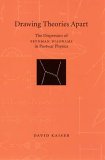
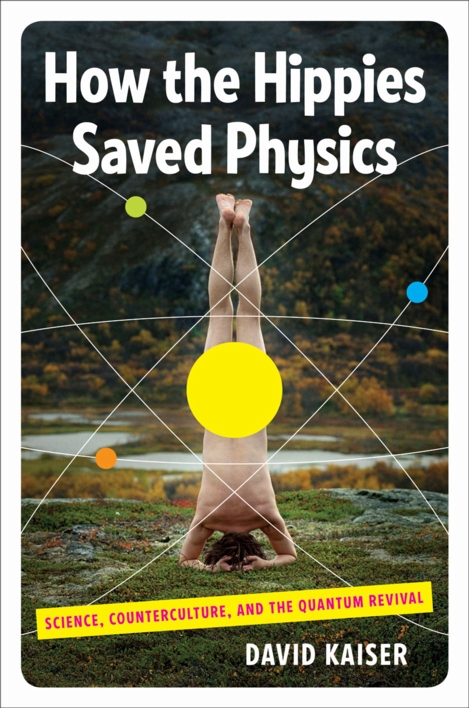
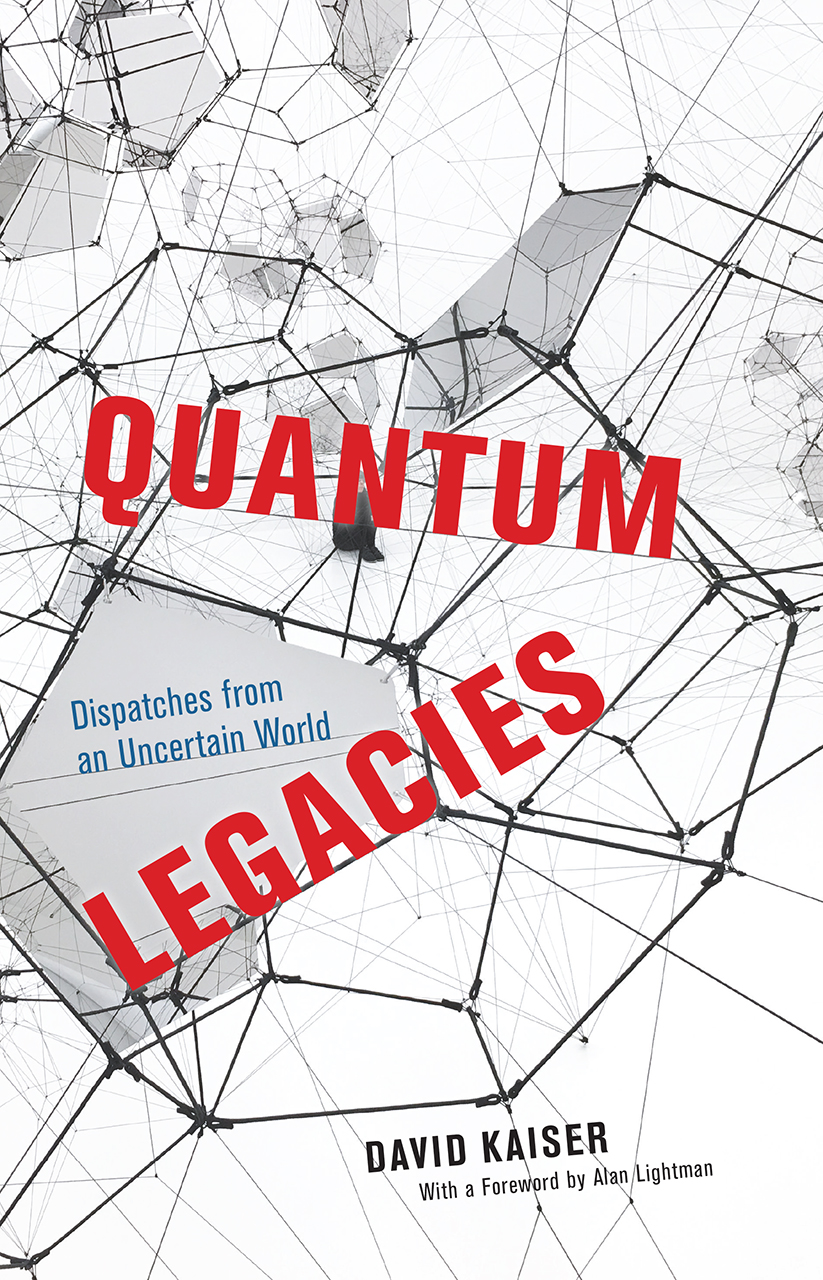
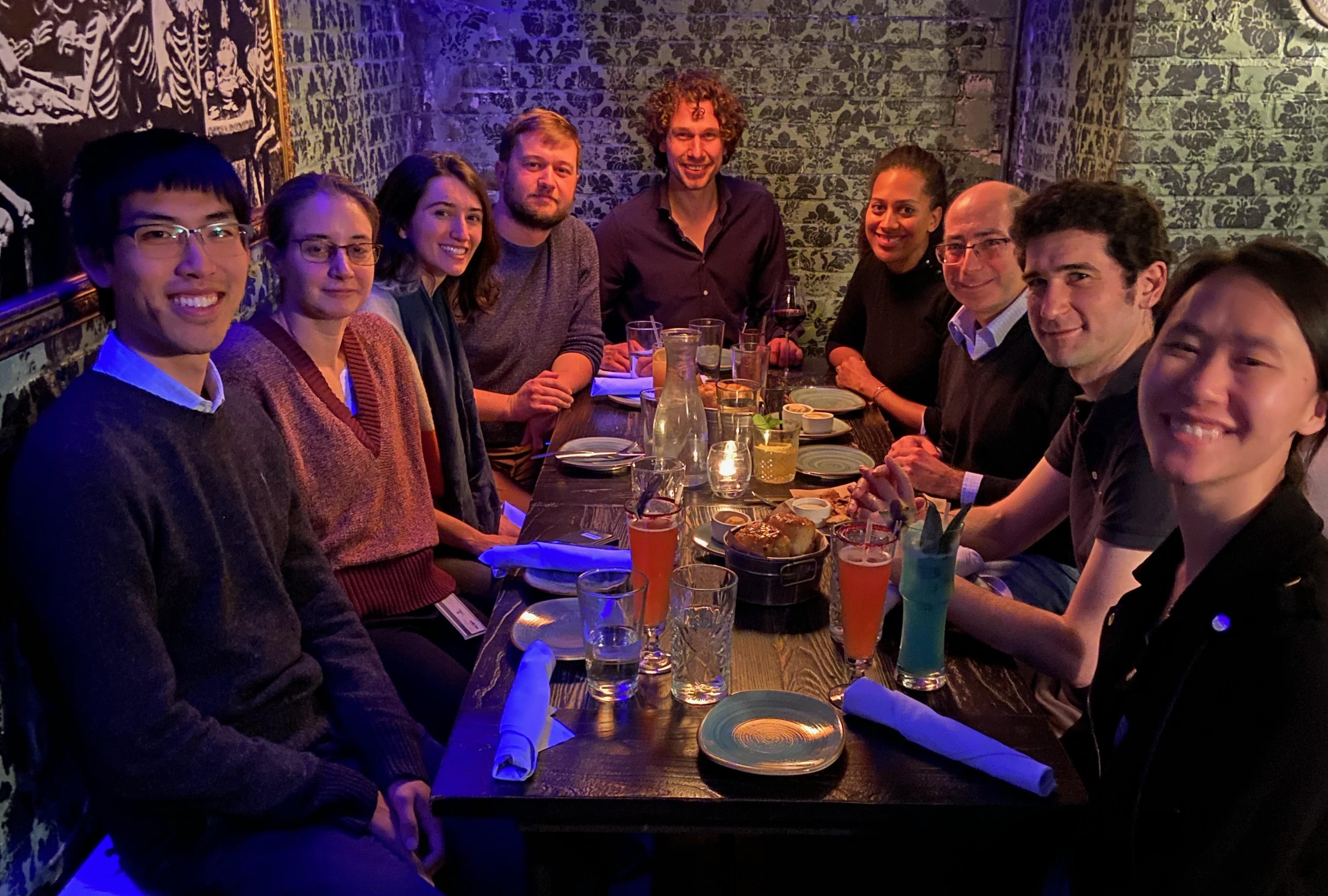
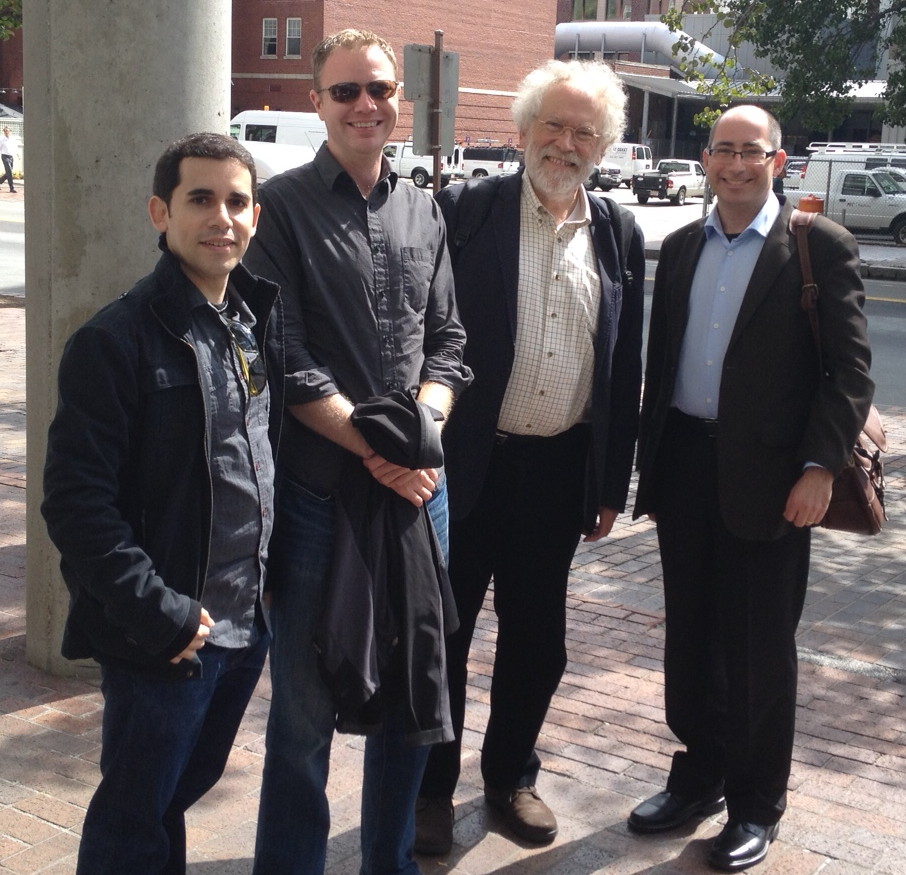 Members of the "Cosmic Bell" team at MIT, September 2014. L to R: Andrew Friedman, Jason Gallicchio, Anton Zeilinger, and David Kaiser.
Members of the "Cosmic Bell" team at MIT, September 2014. L to R: Andrew Friedman, Jason Gallicchio, Anton Zeilinger, and David Kaiser. 